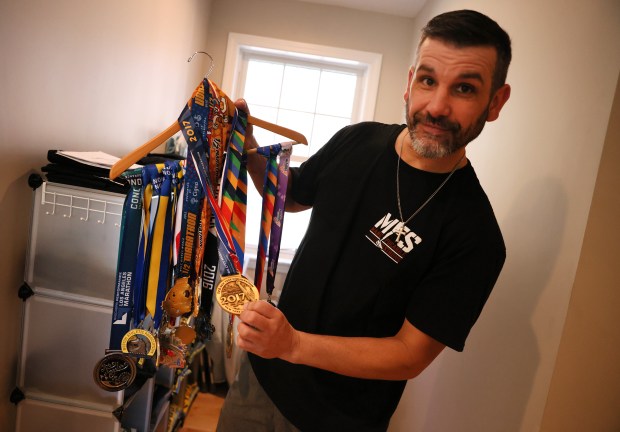


Marc Fucarile has risen from the ashes on Boylston Street.
 Even though he’s reminded daily of the “evil” that robbed him of his right leg at the Boston Marathon bombings a decade ago, he embraces what’s ahead.
Even though he’s reminded daily of the “evil” that robbed him of his right leg at the Boston Marathon bombings a decade ago, he embraces what’s ahead.
He’s living proof of the city’s resilience as the race marks the 10-year anniversary of the terror attack that killed three spectators — Martin Richard, 8, Lingzi Lu, 23, and Krystle Campbell, 29 — and injured or maimed hundreds of others.
Two officers — MIT’s Sean Collier and BPD’s Dennis “DJ” Simmonds — were killed in the manhunt, with Collier shot and Simmonds succumbing to injuries a year later.
Fucarile has the right to be angry, but that’s not the path his faith is taking him down. He is the epitome of Boston Strong and his life shows it.
“Tragedy happens to so many people. My message is we need to support one another. You just don’t know what other people are going through,” Fucarile told the Herald this week.
The 44-year-old Stoneham native said it was the “kindness of strangers” who lifted him off the hospital bed in those dark days after the bombings. The letters, cards, drawings, hand-knitted blankets and hats propelled him. That and his now-15-year-old son, Gavin.
“I was blessed with people looking out for me,” he said. “My whole life was fight-and-recover for over three years. But I’m so good now it’s crazy. Looking back, I wasn’t.”
He woke up in a hospital with his right leg mostly gone and his left one possibly next. He had shrapnel lodged in his body, including his heart. The doctors at the Walter Reed National Military Medical Center in Maryland were miracle workers, he says, and that’s when his life took a turn.
“I give all the credit to my mother. She gave me tough love and taught me to be independent,” Fucarile said.
So he fought to save his left leg, bought a wheelchair, and a prosthetic limb and got back to living. Sure, he admitted the pain he feels daily reminds him of the “little prick” still appealing a death sentence for planting two bombs at the finish line of the marathon on April 15, 2013. The case is before the U.S. First Circuit Court of Appeals.
“I get to put a leg on every day to be reminded of him,” Fucarile said of convicted bomber Dzhokhar Tsarnaev. “But I’m not focusing on that. Yes, I’d love to get my hands on him — he put a bomb down next to kids! ‘You’re a coward!’
“But 10 years later I’m here. I’m married. I’m supporting mobility-impaired people. I’m building that. People need support,” he said. “I have the Marc Network to help fight for accessibility. That’s me. That’s where I am today.”
Fucarile is an unabashed believer who thanks God for “keeping him out of trouble.” The one-time roofer who went to the marathon that day with buddies to cheer on a U.S. Marine veteran running the race said he’s not looking back.
“I’m alive,” he says, sharing the mantra he delivers as an inspirational speaker to kids and veterans alike from Texas to Vermont. “I love skiing. I skied before I walked again. I love sled hockey. I love my wife, Niki, and I love my son.”
Fucarile says two men did “something evil that day” — Tamerlan and Dzhokhar Tsarnaev — and “three friends tried to cover it up.” Tameralan was run over and killed by his brother, Dzhokhar, at a shootout in Watertown April 19, 2013. Both detonated the Boylston Street bombs, with Dzhokhar later stopping at a store for milk.
Dzhokhar’s UMass Dartmouth buddies who looked the other way for their pot-toking friend — Azamat Tazhayakov, Robel Phillipos, and Dias Kadyrbayev — did short jail stints. They, in various statements, “apologized to the people of Boston.” The UMass gang all got out of federal prisons no later than 2018. Tazhayakov and Kadyrbayev were deported to Kazakhstan.
Fucarile, however, chooses to focus on the “million good people” who have helped over the years.
“Everything happens for a reason,” he said. “It’s God’s will. The marathon bombing changed the course of my life. But now I’m hired to speak and I support that by selling T-shirts and helping raise money for the Greg Hill Foundation.”
That foundation, says WEEI host Greg Hill, helps marathon bombing survivors pay the bills insurance won’t cover.
“People are so generous,” Hill said of the $25 million in donations that have come in over the decade. “We honor their strength and resiliency.”
He included the first responders — from police officers to EMTs — to the doctors, nurses, physical therapists and craftsmen who built prosthetic legs as the unsung heroes.
The bombing was borne out of something sinister by Chechen brothers embraced by their new country who betrayed that trust. But in the aftermath, it’s stronger people, like Marc Fucarile, who are helping amputees see there’s still a way forward.
As the proverb states: “Fall seven times, stand up eight.” Marc Fucarile is standing tall today.
This is the first in an occasional series looking back at the Boston Marathon. All comments are welcome to joed@bostonherald.com.









